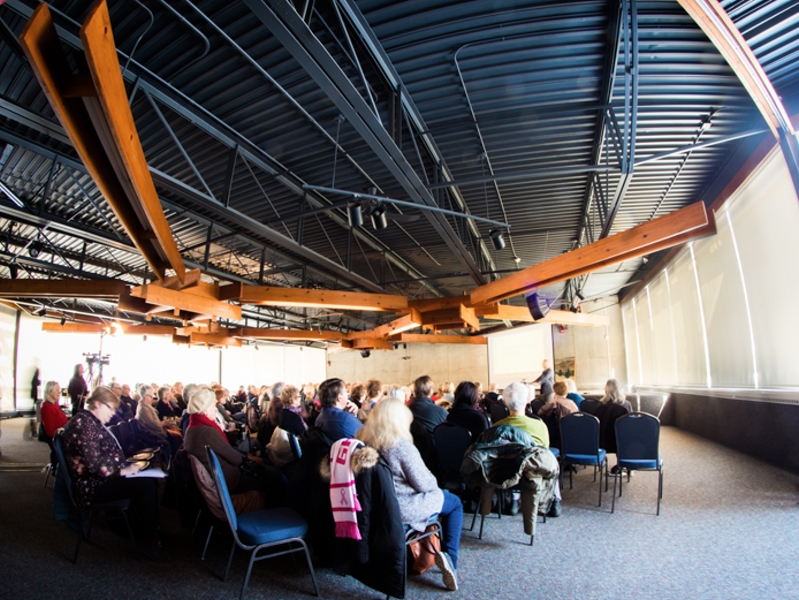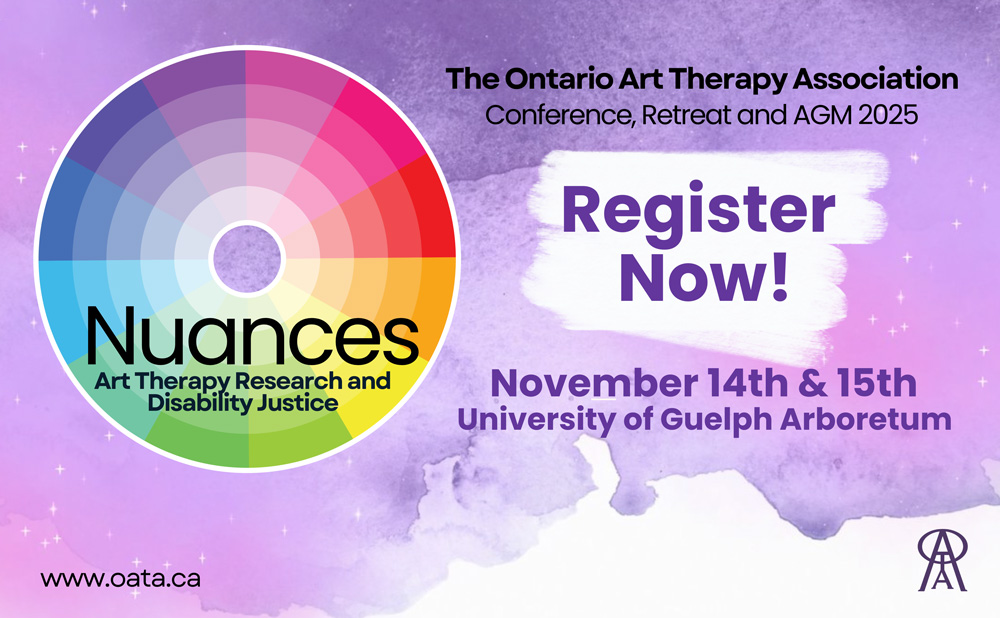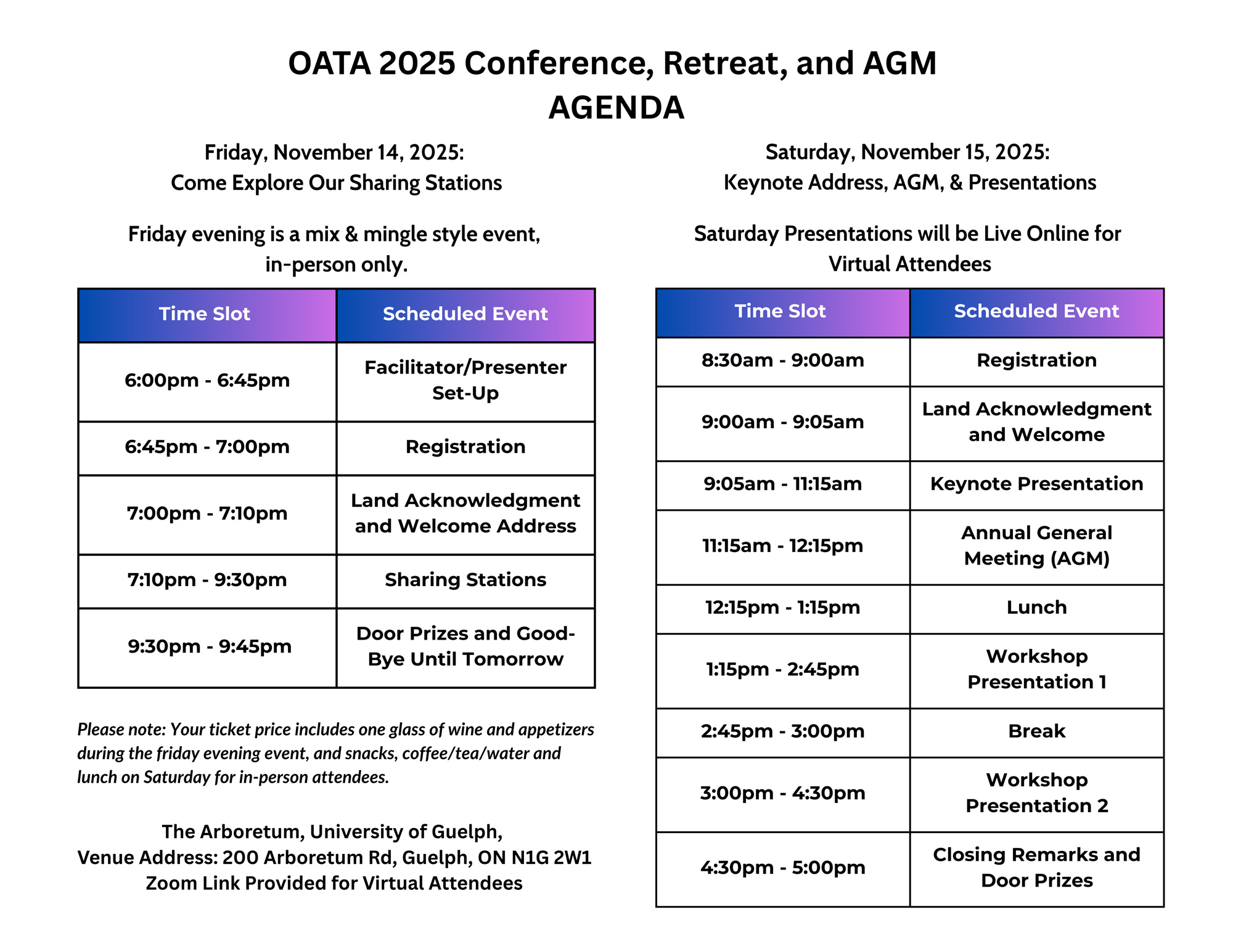Love is a Line that Doesn’t End: Entanglement, Disability Justice, and Creative Praxis
By Patricia Ki RSW, RCAT, PhD with Jacquie Compton, RP, RCAT, and Sharlene Friedman RCAT, RP
Explore what it means to hold space for the complexities and entanglements in ourselves and others, to be rooted in our fundamental values in care work, while resisting injustices and supremacist ideologies. Patricia Ki will offer an overview of disability justice principles, their connectedness to arts therapy practices, and their centrality in informing the necessary shifts and transformation that this field must make to meaningfully and helpfully meet the needs of the people in our shared timeplace of deepening polycrisis. We need each other more than ever in this moment. Throughout the session, Patricia will be joined by Sharlene Friedman and Jacquie Compton, dear colleagues and fellow members of Creative Arts Therapists & Students Against Genocide, in collectively offering facilitated arts-making reflection practices — because the future that we want that is rooted in collective care, dignity and liberation, will not suddenly appear, but can only be practiced into being in our shared present.
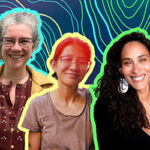 Patricia Hoi Ling Ki (she/her) is an immigrant/settler of Chinese-Hakka descent living and working in Tkaronto. The land of the Hakka village in Hong Kong to which she belongs, the enthusiastic brilliance of students, the solidarity amongst diverse peoples, and the transformative magic of arts-making are the sources of her imaginings, efforts, and hopes toward a decolonial future of collective care and thriving. She currently serves the community at Toronto Art Therapy Institute as the executive director, practicum supervisor, instructor, and research advisor. She is also an adjunct faculty in the Critical Disability Studies program at York University. She is a graduate of Ontario College of Art and Design (BFA 2007), TATI (2011) and York University (BSW 2013, MSW 2014, PhD Critical Disability Studies 2023). She is a psychiatric survivor; she is where she is today because making art saved her life. She deeply believes that arts-making for healing must be shared as widely and freely as possible.
Patricia Hoi Ling Ki (she/her) is an immigrant/settler of Chinese-Hakka descent living and working in Tkaronto. The land of the Hakka village in Hong Kong to which she belongs, the enthusiastic brilliance of students, the solidarity amongst diverse peoples, and the transformative magic of arts-making are the sources of her imaginings, efforts, and hopes toward a decolonial future of collective care and thriving. She currently serves the community at Toronto Art Therapy Institute as the executive director, practicum supervisor, instructor, and research advisor. She is also an adjunct faculty in the Critical Disability Studies program at York University. She is a graduate of Ontario College of Art and Design (BFA 2007), TATI (2011) and York University (BSW 2013, MSW 2014, PhD Critical Disability Studies 2023). She is a psychiatric survivor; she is where she is today because making art saved her life. She deeply believes that arts-making for healing must be shared as widely and freely as possible.
Professionally, Patricia is a registered member of the Canadian Art Therapy Association and the Ontario College of Social Workers and Social Service Workers. She started practicing professionalized care work (Art Therapy, Psychotherapy, Social Work) in 2008 and has worked in various mental health, substance use, housing, education, and social services in Tkaronto. With a commitment to disability justice, she has worked alongside individuals in navigating effects of violence, housing/income insecurity, and intersecting forms of marginalization and oppression.
Jacquie Compton (she/they) RP, RCAT, is a trauma therapist, educator, clinical consultant and poet. She is an Art Therapist, a certified advanced practitioner in sensorimotor psychotherapy, and an SPI-approved clinical consultant.
Jacquie is a faculty member and clinical supervisor at the Toronto Art Therapy Institute, where she teaches courses on trauma-informed practice, embodiment, anti-oppressive practice and cultural humility in art therapy. She is also a trainer with the Sensorimotor Psychotherapy Institute. With over 18 years of clinical experience, she continues to develop an embodied, trauma-focused practice incorporating art-based and somatic-based approaches. Her approach is deeply rooted in anti-oppressive, anti-racist, decolonizing, feminist, and trauma-informed praxis. Jacquie believes in the embodiment of practices beyond the therapeutic relationship and welcomes others to experience the beauty of being in a relationship with themselves, others, and the world around them through the wisdom of the body.
Sharlene Friedman (DTATI, RCAT, RP) is a Registered Psychotherapist and Registered Canadian Art Therapist. Sharlene has been in independent practice since 1989 and has focused on trauma, recovery, personal growth and supervision. Sharlene has been on faculty with the Toronto Art Therapy Institute since 2007 as the Group Art Therapy Experiential facilitator. She is deeply informed by her learning in Processwork – a theory that integrates many wisdoms, specifically deep democracy and signal awareness. She practices from an anti-oppressive, anti-racist, feminist, trauma-informed approach. She is the co-author of the manual, Weaving Our Voices-An Open Group for Women who have Survived Childhood Sexual Abuse and Trauma- Group Leaders Manual, and was responsible for training agencies in Peel, Guelph and Toronto in this model. Her practice of Jin Shin Jyutsu®, a physio philosophy, allows her to bring harmony — body, mind, spirit — into her daily life and work.
Workshop Presentation 1: Narrative Art Therapy as a Conduit to Disability Justice
By Stephanie Thorson, RP, DTATI, MES, BAHon.
Narrative Art Therapy (NAT) situates an experience or series of experiences in a larger frame, including the preceding state, and the direction the client wants to go, and/or goal they wish to achieve. In this workshop, Stephanie will give a NAT case presentation as an example, and invite participants to create their own narrative art series related to how disability justice relates to their own life. We will share learnings in small groups, and gather as a group to highlight possible applications to participants’ practices with individuals or groups.
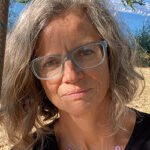 Stephanie Thorson is a practicing Art Therapist and RP since 2020, working in her own private practice with youth and adult populations. She relies on Psychodynamic, Internal Family Systems (IFS) and Narrative Art Therapy (NAT) as her primary modalities. She conducted a popular online workshop for OATA in 2024 that combined Art Therapy and IFS.
Stephanie Thorson is a practicing Art Therapist and RP since 2020, working in her own private practice with youth and adult populations. She relies on Psychodynamic, Internal Family Systems (IFS) and Narrative Art Therapy (NAT) as her primary modalities. She conducted a popular online workshop for OATA in 2024 that combined Art Therapy and IFS.
Workshop Presentation 2: Anti-Fat Bias and Art Therapy: Beyond Body Image
By Carly Leyburne, RCAT, RP
This workshop explores anti-fat bias: what it is, how to talk about it, and its relevance to Art Therapy. Participants will gain tools for addressing body image concerns with greater nuance, both personally and professionally. Anti-fat bias impacts everybody, and everybody deserves affirming, inclusive care.
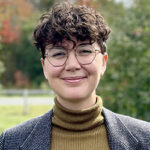 Carly Leyburne (they/them) is a queer Art Therapist and visual artist living in Hamilton, Ontario. They primarily work with youth, utilizing creative expression as a tool for healing, connection, and self-discovery. Carly’s approach is grounded in compassion, community, and a deep belief in the transformative power of art. In both their therapeutic and artistic practices, they create spaces where young people feel safe, seen, and supported. Outside of work, Carly finds joy in nature, reading, and journaling. They are passionate about building relationships, fostering curiosity, decolonizing, and making space for authentic expression.
Carly Leyburne (they/them) is a queer Art Therapist and visual artist living in Hamilton, Ontario. They primarily work with youth, utilizing creative expression as a tool for healing, connection, and self-discovery. Carly’s approach is grounded in compassion, community, and a deep belief in the transformative power of art. In both their therapeutic and artistic practices, they create spaces where young people feel safe, seen, and supported. Outside of work, Carly finds joy in nature, reading, and journaling. They are passionate about building relationships, fostering curiosity, decolonizing, and making space for authentic expression.
Sharing Stations
Navigating Client Care with First Nations Children who may be ASD or on the FASD spectrum, with Art Therapy
By Naomi Kates, MA, RP, RCAT and Carly Leyburne, RP, RCAT
Sharing our experiences working with First Nations children and youth in remote Northern Ontario Communities. Working mainly in a virtual setting, reaching our clients in their schools and homes, we will share how we navigate client care respectfully within the community, and advocate for Art Therapy; particularly for children and youth that have shown symptoms of Autism Spectrum Disorder (ASD), and/or the Fetal Alcohol Spectrum Disorder (FASD).
 Naomi Kates (she/her) is a registered art therapist based in Toronto. Naomi takes an arts-based, humanistic approach lending from psychodynamics, play therapy and narrative work. In the past she has worked with children, teens and with younger and older residents in long term care with a particular focus on how the arts intersect with disability and how art can be a medium for disability advocacy and awareness. As an ally and Art Therapist to First Nations communities, working remotely, Naomi feels strongly about how advocacy plays a key role in supporting voice and enabling access.
Naomi Kates (she/her) is a registered art therapist based in Toronto. Naomi takes an arts-based, humanistic approach lending from psychodynamics, play therapy and narrative work. In the past she has worked with children, teens and with younger and older residents in long term care with a particular focus on how the arts intersect with disability and how art can be a medium for disability advocacy and awareness. As an ally and Art Therapist to First Nations communities, working remotely, Naomi feels strongly about how advocacy plays a key role in supporting voice and enabling access.
 Carly Leyburne (they/them) is a queer Art Therapist and visual artist living in Hamilton, Ontario. They primarily work with youth, utilizing creative expression as a tool for healing, connection, and self-discovery. Carly’s approach is grounded in compassion, community, and a deep belief in the transformative power of art. In both their therapeutic and artistic practices, they create spaces where young people feel safe, seen, and supported. Outside of work, Carly finds joy in nature, reading, and journaling. They are passionate about building relationships, fostering curiosity, decolonizing, and making space for authentic expression.
Carly Leyburne (they/them) is a queer Art Therapist and visual artist living in Hamilton, Ontario. They primarily work with youth, utilizing creative expression as a tool for healing, connection, and self-discovery. Carly’s approach is grounded in compassion, community, and a deep belief in the transformative power of art. In both their therapeutic and artistic practices, they create spaces where young people feel safe, seen, and supported. Outside of work, Carly finds joy in nature, reading, and journaling. They are passionate about building relationships, fostering curiosity, decolonizing, and making space for authentic expression.
Sculpting Symbols of Self: Inclusive Art-Making with Everyday Materials
By Sylvia Chan, BFA, B.Ed
Explore inclusive, trauma-informed art-making using everyday and recycled materials. This hands-on workshop guides participants to create symbolic sculptures that foster identity, agency, and connection through a disability justice lens. No art experience needed—just curiosity and openness to accessible, community-centered creative expression.
 Sylvia Chan (she/her) is a multidisciplinary artist, certified educator, and emerging Art Therapist based in York Region, Ontario. With a Bachelor of Fine Arts and Bachelor of Education, she blends her passion for creative expression with inclusive, trauma-informed teaching. Sylvia is the founder and director of Creative Genius Academy, where she designs and facilitates art programs for racialized, neurodivergent, and disabled youth in school and community settings.
Sylvia Chan (she/her) is a multidisciplinary artist, certified educator, and emerging Art Therapist based in York Region, Ontario. With a Bachelor of Fine Arts and Bachelor of Education, she blends her passion for creative expression with inclusive, trauma-informed teaching. Sylvia is the founder and director of Creative Genius Academy, where she designs and facilitates art programs for racialized, neurodivergent, and disabled youth in school and community settings.
Caring for the Caregiver: Art Therapy in the NICU
Gill Yealland, RP, OATR, RCAT and Claire Webster, RP, Professional Art Therapist
The Art Therapy program at Children’s Hospital is excited to share about their new initiative supporting parents/ caregivers in the NICU (Neonatal Intensive Care Unit). Learn about significant stressors experienced by caregivers in NICU, and how Art Therapy offers families opportunities for meaningful memory making. Our sharing station will include tactile examples and offer a simple art experiential.
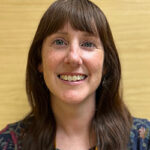 Gill Yealland is a Registered Psychotherapist and Registered Art Therapist in London Ontario. In her role as Art Therapist at the Children’s Hospital Gill supports children and teens with significant medical diagnoses and eating disorders, in individual and group formats. Outside of her role at the hospital, Gill also has a private practice supporting children, teens, and adults. Throughout her career Gill served as an OATA Board member and provides clinical supervision to Art Therapy students and professionals.
Gill Yealland is a Registered Psychotherapist and Registered Art Therapist in London Ontario. In her role as Art Therapist at the Children’s Hospital Gill supports children and teens with significant medical diagnoses and eating disorders, in individual and group formats. Outside of her role at the hospital, Gill also has a private practice supporting children, teens, and adults. Throughout her career Gill served as an OATA Board member and provides clinical supervision to Art Therapy students and professionals.
 Claire Webster is a Registered Psychotherapist and Professional Art Therapist at London Children’s Hospital. In her role at the hospital, Claire supports children and their siblings as they navigate medical diagnoses, grief, and bereavement. She works from a family-centred approach, honouring the uniqueness of each individual, their experiences, and their overall journey. Claire is passionate about creating a safe and expressive space where children and families can explore, process, and find strength through creativity. Outside of the hospital, Claire enjoys spending time in nature, hiking, and camping.
Claire Webster is a Registered Psychotherapist and Professional Art Therapist at London Children’s Hospital. In her role at the hospital, Claire supports children and their siblings as they navigate medical diagnoses, grief, and bereavement. She works from a family-centred approach, honouring the uniqueness of each individual, their experiences, and their overall journey. Claire is passionate about creating a safe and expressive space where children and families can explore, process, and find strength through creativity. Outside of the hospital, Claire enjoys spending time in nature, hiking, and camping.
Examining Character Strengths of Creative Arts Therapists and Developmental Service Workers in Canada
Morgan E. Braganza, MSW, PhD, Assistant Professor (Social Work), Olena Darewych, PhD, RP, RCAT
This Sharing Station will highlight the research findings of a survey study which examined the most prominent character strengths in creative arts therapists (i.e., art therapists, music therapists, expressive arts therapists, play therapists) employed in Canada and how they apply their strengths in their work settings with clients and colleagues.
 Morgan Braganza is Assistant Professor of Social Work at Redeemer University. She completed her PhD in Social Work at Wilfrid Laurier University. Her research and evaluation projects have covered topics including community-, sports-, and faith-based programming, character strengths, inter-organizational collaboration; poverty; domestic violence; violence against women; and perinatal mood and anxiety disorders. She currently provides training sessions for various audiences interested in improving interactions with those who hold contentious or difficult differences (e.g. identity, viewpoint).
Morgan Braganza is Assistant Professor of Social Work at Redeemer University. She completed her PhD in Social Work at Wilfrid Laurier University. Her research and evaluation projects have covered topics including community-, sports-, and faith-based programming, character strengths, inter-organizational collaboration; poverty; domestic violence; violence against women; and perinatal mood and anxiety disorders. She currently provides training sessions for various audiences interested in improving interactions with those who hold contentious or difficult differences (e.g. identity, viewpoint).
Sharing the Imagination Hub
Olena Darewych, PhD, RP, RCAT
The sharing station will showcase the Imagination Hub at Lawson Ministries Hamilton Autism Centre which includes the art therapy and expressive arts therapy program. As part of the Imagination Hub, the creative arts therapy programs enable adults with autism to engage with a variety of sensory-stimulating art media, expand their imaginative thinking abilities, and talk about their thoughts, emotions, and stories related to their creations with the therapists.
 Olena Darewych is a Registered Psychotherapist in Ontario, a Registered Canadian Art Therapist, and Adjunct Faculty in the Department of Spiritual Care and Psychotherapy at Martin Luther University College which is federated with Wilfrid Laurier University. She completed her PhD in Expressive Therapies at Lesley University and as a mental health practitioner has 24 years of experience working with individuals of all ages and from culturally diverse backgrounds in a variety of clinical settings in Australia, Canada, USA, and Ukraine. She currently facilitates expressive arts therapy sessions for adults with autism spectrum disorders at Lawson Ministries Hamilton Autism Centre. Her research explores the intersectionality between positive psychology and the arts, specifically how the two approaches in combination can enhance individuals’ well-being.
Olena Darewych is a Registered Psychotherapist in Ontario, a Registered Canadian Art Therapist, and Adjunct Faculty in the Department of Spiritual Care and Psychotherapy at Martin Luther University College which is federated with Wilfrid Laurier University. She completed her PhD in Expressive Therapies at Lesley University and as a mental health practitioner has 24 years of experience working with individuals of all ages and from culturally diverse backgrounds in a variety of clinical settings in Australia, Canada, USA, and Ukraine. She currently facilitates expressive arts therapy sessions for adults with autism spectrum disorders at Lawson Ministries Hamilton Autism Centre. Her research explores the intersectionality between positive psychology and the arts, specifically how the two approaches in combination can enhance individuals’ well-being.
Art Therapy at Hospice: Supporting Grief in Creative Community
Erica Palmer she/her, Art Therapist, RP (Qualifying), DTATI
This sharing station seeks to provide a learning space for discussion of the art therapist’s role in the not-for-profit sector where vulnerable and marginalized populations are often served. We will discuss the experience of being an art therapist in a hospice setting specifically with the unique opportunities present in this role. Discussion will also include practical approaches in group settings to creatively support people who are grieving, caregiving, and approaching end of life. At the conclusion of this sharing station, we seek to meet the below goals:
An increased understanding of the role and potential for art therapy to play within the not-for-profit and healthcare sector;
Practical approaches for providing collaborative, creative opportunities within group art therapy offerings;
Accessibility considerations when working with people who are grieving, caregiving, and approaching end of life.
 Erica Palmer is a Professional Art Therapist working in specialized not-for-profit healthcare at Hospice Wellington in Guelph, ON, providing art therapy services to caregivers, bereaved individuals, and those receiving a palliative approach to care facing an imminent end of life. Erica’s approach to care in this setting is community focused with an understanding that healing and connection during incredible life transitions requires a shift in societal level compassion towards the populations served. Erica sat on the advisory board for the University of Guelph Bachelor of Creative Arts, Health, and Wellness, and has guest lectured in this program.
Erica Palmer is a Professional Art Therapist working in specialized not-for-profit healthcare at Hospice Wellington in Guelph, ON, providing art therapy services to caregivers, bereaved individuals, and those receiving a palliative approach to care facing an imminent end of life. Erica’s approach to care in this setting is community focused with an understanding that healing and connection during incredible life transitions requires a shift in societal level compassion towards the populations served. Erica sat on the advisory board for the University of Guelph Bachelor of Creative Arts, Health, and Wellness, and has guest lectured in this program.
LOCATION
The Arboretum at the University of Guelph was once lived upon and cared for by the the Haudenosaunee, Anishinaabe and Attawandaron among many others in a history that spans eras, this lush, expansive natural sanctuary offers visitors a chance to connect with nature.

Spanning over 400 acres, it features diverse plant collections, gardens, and trails that provide a serene backdrop for walking, birdwatching, and photography. The Arboretum is a vital resource for education, research, and conservation, making it a hub for scientific inquiry and public engagement. In addition to its natural beauty, the Arboretum also offers conference facilities suitable for meetings, workshops, and events. These spaces are equipped with modern amenities, ensuring a comfortable and productive environment for any gathering. For more information on the history of the land that is now the Arboretum please click here.
